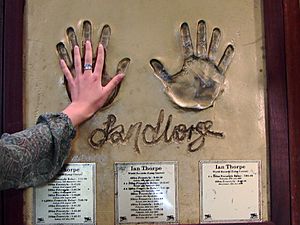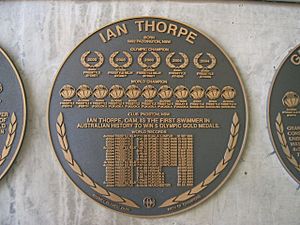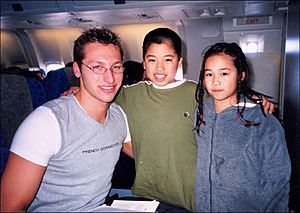Ian Thorpe facts for kids
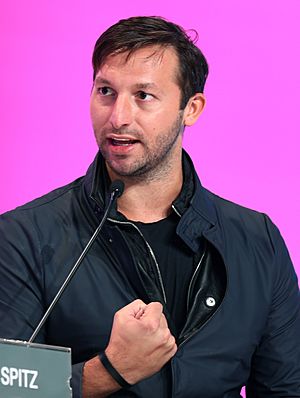
Thorpe at Doha GOALS Forum 2012
|
||||||||||||||||||||||||||||||||||||||||||||||||||||||||||||||||||||||||||||||||||||||||||||||||||||||||||||||||||||||||||||||||||||||||||||||||||||||||||||||||||||||||||||||||||||||||||||||||||||||
| Personal information | ||||||||||||||||||||||||||||||||||||||||||||||||||||||||||||||||||||||||||||||||||||||||||||||||||||||||||||||||||||||||||||||||||||||||||||||||||||||||||||||||||||||||||||||||||||||||||||||||||||||
|---|---|---|---|---|---|---|---|---|---|---|---|---|---|---|---|---|---|---|---|---|---|---|---|---|---|---|---|---|---|---|---|---|---|---|---|---|---|---|---|---|---|---|---|---|---|---|---|---|---|---|---|---|---|---|---|---|---|---|---|---|---|---|---|---|---|---|---|---|---|---|---|---|---|---|---|---|---|---|---|---|---|---|---|---|---|---|---|---|---|---|---|---|---|---|---|---|---|---|---|---|---|---|---|---|---|---|---|---|---|---|---|---|---|---|---|---|---|---|---|---|---|---|---|---|---|---|---|---|---|---|---|---|---|---|---|---|---|---|---|---|---|---|---|---|---|---|---|---|---|---|---|---|---|---|---|---|---|---|---|---|---|---|---|---|---|---|---|---|---|---|---|---|---|---|---|---|---|---|---|---|---|---|---|---|---|---|---|---|---|---|---|---|---|---|---|---|---|---|
| Nickname(s) |
|
|||||||||||||||||||||||||||||||||||||||||||||||||||||||||||||||||||||||||||||||||||||||||||||||||||||||||||||||||||||||||||||||||||||||||||||||||||||||||||||||||||||||||||||||||||||||||||||||||||||
| Born | 13 October 1982 Sydney, Australia |
|||||||||||||||||||||||||||||||||||||||||||||||||||||||||||||||||||||||||||||||||||||||||||||||||||||||||||||||||||||||||||||||||||||||||||||||||||||||||||||||||||||||||||||||||||||||||||||||||||||
| Height | 1.96 m (6 ft 5 in) | |||||||||||||||||||||||||||||||||||||||||||||||||||||||||||||||||||||||||||||||||||||||||||||||||||||||||||||||||||||||||||||||||||||||||||||||||||||||||||||||||||||||||||||||||||||||||||||||||||||
| Weight | 104 kg (229 lb) | |||||||||||||||||||||||||||||||||||||||||||||||||||||||||||||||||||||||||||||||||||||||||||||||||||||||||||||||||||||||||||||||||||||||||||||||||||||||||||||||||||||||||||||||||||||||||||||||||||||
| Sport | ||||||||||||||||||||||||||||||||||||||||||||||||||||||||||||||||||||||||||||||||||||||||||||||||||||||||||||||||||||||||||||||||||||||||||||||||||||||||||||||||||||||||||||||||||||||||||||||||||||||
| Sport | Swimming | |||||||||||||||||||||||||||||||||||||||||||||||||||||||||||||||||||||||||||||||||||||||||||||||||||||||||||||||||||||||||||||||||||||||||||||||||||||||||||||||||||||||||||||||||||||||||||||||||||||
| Strokes | Freestyle | |||||||||||||||||||||||||||||||||||||||||||||||||||||||||||||||||||||||||||||||||||||||||||||||||||||||||||||||||||||||||||||||||||||||||||||||||||||||||||||||||||||||||||||||||||||||||||||||||||||
| Club | SLC Aquadot | |||||||||||||||||||||||||||||||||||||||||||||||||||||||||||||||||||||||||||||||||||||||||||||||||||||||||||||||||||||||||||||||||||||||||||||||||||||||||||||||||||||||||||||||||||||||||||||||||||||
| Coach |
|
|||||||||||||||||||||||||||||||||||||||||||||||||||||||||||||||||||||||||||||||||||||||||||||||||||||||||||||||||||||||||||||||||||||||||||||||||||||||||||||||||||||||||||||||||||||||||||||||||||||
|
Medal record
|
||||||||||||||||||||||||||||||||||||||||||||||||||||||||||||||||||||||||||||||||||||||||||||||||||||||||||||||||||||||||||||||||||||||||||||||||||||||||||||||||||||||||||||||||||||||||||||||||||||||
Ian James Thorpe (born October 13, 1982) is a famous Australian swimmer. He is known for his amazing freestyle abilities. He also competed in backstroke and individual medley races. Ian Thorpe won five Olympic gold medals. This makes him one of Australia's most successful Olympic athletes. At the 2000 Summer Olympics in his hometown of Sydney, he won three gold and two silver medals. He was the top athlete at those Games.
At just 14 years old, Thorpe became the youngest male to represent Australia in swimming. He also became the youngest male World Champion. This happened when he won the 400-meter freestyle at the 1998 World Aquatics Championships. After this, Ian Thorpe was almost unbeatable in the 400-meter freestyle. He won this event at every major competition until 2004. In 2001, he made history by winning six gold medals at one World Championship. He set 13 individual world records in long-course swimming. He also helped Australian relay teams win many races. His speed in the water earned him the nickname "Thorpedo." Ian Thorpe stopped competitive swimming in November 2006. He felt he had lost some motivation. He tried to return to the sport in 2011 and 2012.
Overall, Ian Thorpe won eleven World Championship gold medals. This is one of the highest totals for any male swimmer. He was also named Swimming World Swimmer of the Year four times. He was the Australian Swimmer of the Year from 1999 to 2003. His amazing achievements made him a very popular athlete in Australia. In 2000, he was named Young Australian of the Year.
Contents
- Ian Thorpe's Early Life and Swimming Start
- Ian Thorpe's First International Races (1997–1998)
- Record-Breaking Years (1999–2002)
- Ian Thorpe's Training with Tracey Menzies (2003–2006)
- Ian Thorpe's Comeback Attempt (2011–2012)
- Ian Thorpe's Athletic Strengths
- Honours and Awards
- Ian Thorpe's Life After Swimming
- Personal Life and Interests
- See also
Ian Thorpe's Early Life and Swimming Start
Ian Thorpe was born in Sydney, Australia. He grew up in a family that loved sports. His father, Ken, was a good cricketer. His mother, Margaret, played netball. Ian's older sister, Christina, started swimming to help a broken wrist. Five-year-old Ian joined her in the pool. His father wanted Ian to enjoy sports, not feel pressured. Ian was a big baby, weighing about 4.1 kg (9.0 lb) at birth.
When Ian was young, he had an allergy to chlorine. This meant he couldn't swim with his face in the water. He didn't compete in his first race until he was seven. Even with his head out of the water, he won! This was partly because he was quite tall for his age. Ian slowly got over his ailment. By 1994, he was captain of the New South Wales team for the Australian Primary Schools Championships. That year, he won nine gold medals at the New South Wales Short Course Age Championships. In 1995, Ian started high school. He also began training with a new coach, Doug Frost, alongside his sister. Ian competed in his first Australian Age Championships. He won bronze medals in the 200-meter and 400-meter freestyle races. He won all ten events at the New South Wales Age Championships.
National Swimming Competitions
In 1996, Ian Thorpe won five gold medals at the Australian Age Championships. His good times qualified him for the Australian Championships. These championships were also the trials for the 1996 Summer Olympics in Atlanta. Ian was only 13, so his coach wanted him to gain experience. He didn't make the Olympic team that year. Later, he reached his first national final at the Australian Short Course Championships. He was trying to qualify for the 1997 FINA World Swimming Championships. He didn't make the team this time either.
In January 1997, Ian swam the 400-meter freestyle in under four minutes. He was the first 14-year-old Australian to do this! He then competed at the Australian Championships in Adelaide. He aimed to join the national team for the 1997 Pan Pacific Swimming Championships in Fukuoka, Japan. Ian won a bronze medal in the 400-meter freestyle. He set a new personal best time. This was also a world record for his age group. This race was the start of many exciting competitions with fellow swimmer Grant Hackett.
At 14 years and 5 months, Ian Thorpe became the youngest male ever chosen for the Australian team. His coach believed this selection helped him focus on freestyle swimming. Ian continued to excel at the Australian Age Championships. He won ten individual gold medals and two bronze medals. He also set six new Australian records.
Ian Thorpe's First International Races (1997–1998)
Making His International Debut in 1997
| 1997 Pan Pacific Championships | ||
|---|---|---|
| Silver | 400 m freestyle | 3:49.64 |
| Silver | 4×200 m freestyle | 7:15.72 |
Before the 1997 Pan Pacific Championships, Ian had an appendix operation. This meant he missed some training. In Japan, he swam well in the 200-meter freestyle. He then joined the 4 × 200-meter freestyle relay team. With his teammates, he won a silver medal. This made him the youngest Pan Pacific medalist ever. In his first individual final, the 400-meter freestyle, he won another silver medal. He was known for his strong finish in races. Later that year, he qualified for the 1998 World Aquatics Championships in Perth. He set new personal bests in the 200-meter and 400-meter freestyle events.
Winning at the 1998 World Championships
| 1998 World Championships | ||
|---|---|---|
| Gold | 400 m freestyle | 3:46.29 |
| Gold | 4×200 m freestyle | 7:12.45 |
Ian Thorpe's first big international event in Australia was the 1998 World Championships in Perth. He started with the 4 × 200-meter freestyle relay. Ian swam a powerful third leg, helping Australia win gold. This was Australia's first win in this event at a global level since 1956. Then came the 400-meter freestyle final. Grant Hackett led for most of the race. But Ian used his famous strong finish to pass Hackett on the very last stroke! Ian's win made him the youngest male individual world champion ever. He was only 15 years and 3 months old.
After his win, Ian became very popular. He received many offers for TV commercials. He also became a supporter of the Children's Cancer Institute. This was after his sister's future brother-in-law became very ill.
Dominating the 1998 Commonwealth Games
| 1998 Commonwealth Games | ||
|---|---|---|
| Gold | 200 m freestyle | 1:46.70 |
| Gold | 400 m freestyle | 3:44.35 |
| Gold | 4×100 m freestyle | 3:17.83 |
| Gold | 4×200 m freestyle | 7:11.86 (WR) |
Ian's next competition was the Australian Championships in Melbourne. These trials were for the 1998 Commonwealth Games in Malaysia. Ian continued to improve. He won the 200-meter freestyle, setting a new Commonwealth record. He also won the 400-meter freestyle. He earned a silver medal in his first 100-meter freestyle race at this level. This meant he was selected for three individual events at the Commonwealth Games.
At the Commonwealth Games in Kuala Lumpur, Ian's success continued. He won the 200-meter freestyle. Then, he teamed up with Michael Klim, Daniel Kowalski, and Matt Dunn in the 4 × 200-meter freestyle relay. They broke the world record! Ian also won gold in the 4 × 100-meter freestyle relay. He claimed a fourth gold medal in the 400-meter freestyle.
Ian left school after Year 10 to focus on swimming. Some people worried he might get tired of swimming too quickly. But Ian said swimming was only a small part of his life. He was named the Swimming World Swimmer of the Year. He was the youngest male swimmer to receive this honor.
Record-Breaking Years (1999–2002)
| 1999 World Short Course Championships | ||
|---|---|---|
| Gold | 200 m freestyle | 1:43.28 (WR) |
| Gold | 4×100 m freestyle | 3:11.21 |
| Silver | 400 m freestyle | 3:35.64 |
In 1999, many people expected Ian Thorpe to break more world records. He was still growing stronger. At the 1999 Australian Championships, he won the 400-meter freestyle again. However, Grant Hackett won the 200-meter event. Ian then swam the 100-meter freestyle in under 50 seconds for the first time. The Australian team then went to Hong Kong for the 1999 World Short Course Championships. There, Ian broke the world record in the 200-meter freestyle. This record had stood for a long time. This period marked the start of Ian setting 13 individual world records. He also led Australian relay teams to many victories over the American teams. In 2001, he won six gold medals at one World Championship. Australia topped the medal count at a global meet for the first time since 1956. During these years, he was named Swimming World Swimmer of the Year three times.
Setting New Records at the 1999 Pan Pacific Championships
| 1999 Pan Pacific Championships | ||
|---|---|---|
| Gold | 200 m freestyle | 1:46.00 (WR) |
| Gold | 400 m freestyle | 3:41.83 (WR) |
| Gold | 4×100 m freestyle | 3:16.08 |
| Gold | 4×200 m freestyle | 7:08.70 (WR) |
The 1999 Pan Pacific Swimming Championships were held in August in Sydney Olympic Park. This was a practice run for the 2000 Summer Olympics at the same venue. Everyone expected Ian to set world records. On the first night, he competed in the 400-meter freestyle final. He broke away from the other swimmers and set a new world record. He cut almost two seconds off the old record! After this amazing swim, his coach called him "the greatest swimmer we've [Australia] ever had."
Later that night, Ian helped Australia win the 4 × 100-meter freestyle final. This was a historic win because the United States had never lost this event before. Ian swam the final part of the relay very fast. The next night, he broke the 200-meter freestyle world record in the semi-finals. The day after, he broke it again in the final! He finished his competition by leading the 4 × 200-meter freestyle team to victory. They broke their own world record by more than three seconds. This meant Ian had set four world records in four nights.
After these championships, Ian signed a sponsorship deal with Adidas. This caused some issues because the Australian team wore Speedo uniforms. Ian also broke a bone in his ankle while jogging later that year. Despite these challenges, he was again named World Swimmer of the Year. He also received awards like Young Australian of the Year.
Preparing for the 2000 Olympics
Ian Thorpe started 2000 by trying to add a third individual event to his Olympic schedule. He won the 1500-meter freestyle at the New South Wales Championships. He then went on a European tour to improve his racing skills. There was some discussion about his choice of swimsuit. Eventually, he was allowed to wear his Adidas suit.
With everything settled, Ian went to the Olympic selection trials in Sydney in May 2000. He broke his 400-meter world record again on the first night. This earned him his first Olympic selection. The next day, he broke his 200-meter world record twice! He tried to qualify for the 100-meter freestyle but finished fourth. He also withdrew from the 1500-meter event.
Triumphs at the 2000 Sydney Olympics
| 2000 Summer Olympics | ||
|---|---|---|
| Gold | 400 m freestyle | 3:40.59 (WR) |
| Gold | 4×100 m freestyle | 3:13.67 (WR) |
| Gold | 4×200 m freestyle | 7:07.05 (WR) |
| Silver | 200 m freestyle | 1:45.83 |
| Silver | 4×100 m medley | 3:35.27 |
The Australian public had high hopes for Ian Thorpe at the Sydney Olympics. On the first morning, he easily swam through the heats of the 400-meter freestyle. He set a new Olympic record. That night, in the final, he led the whole race. He set a new world record of 3 minutes 40.59 seconds.
Later that night, Ian joined Michael Klim, Chris Fydler, and Ashley Callus in the 4 × 100-meter freestyle relay. The United States had never lost this event at the Olympics. Ian swam the final leg and caught up to the American swimmer, Gary Hall Jr., in the last few meters. Australia won, causing huge celebrations! The Australian team even played "air guitar" on the pool deck, responding to a comment Hall had made earlier.
The next morning, Ian broke the 200-meter freestyle Olympic record in the heats. His main rival, Pieter van den Hoogenband from the Netherlands, then broke the world record in the semi-finals. In the final, van den Hoogenband started very fast. Ian chased him but finished second. This was the first time he had swum slower in a final than in the qualifying rounds.
Ian returned to win the 4 × 200-meter freestyle relay the next night. He gave Australia a big lead in the first leg. He, Klim, Bill Kirby, and Todd Pearson broke their own world record. Ian also swam in the heats of the 4 × 100-meter medley relay. He earned a silver medal when the team finished second in the final. Ian was Australia's top medalist at the Games. He carried the flag at the closing ceremony. He won three gold and two silver medals.
Achieving Six Golds at the 2001 World Championships
| 2001 World Championships | ||
|---|---|---|
| Gold | 200 m freestyle | 1:44.06 (WR) |
| Gold | 400 m freestyle | 3:40.17 (WR) |
| Gold | 800 m freestyle | 7:39.16 (WR) |
| Gold | 4×100 m freestyle | 3:14.10 |
| Gold | 4×200 m freestyle | 7:04.66 (WR) |
| Gold | 4×100 m medley | 3:35.35 |
At the 2001 Australian Championships, Ian Thorpe added the 800-meter freestyle to his events. He successfully defended his 400-meter title. The next night, in the 800-meter event, he broke Kieren Perkins' 1994 world record. He then broke van den Hoogenband's 200-meter world record. This made him one of only a few swimmers to hold world records in three distances at once. He also won the 100-meter freestyle. This meant he held all Australian freestyle titles from 100m to 800m.
Ian arrived in Fukuoka, Japan, for the 2001 World Championships. He was a big star there. On the first night, he broke his 400-meter world record again. He then helped Australia win the 4 × 100-meter freestyle relay. In the 800-meter final, he won by a body length, breaking his world record again. The 200-meter freestyle was a rematch with van den Hoogenband. This time, Ian won and broke his own world record.
Ian finished fourth in the 100-meter freestyle. But he returned to form in the 4 × 200-meter freestyle relay. The Australian team broke their world record again. Ian also anchored the 4 × 100-meter medley relay team. He caught up to the American swimmer, Anthony Ervin, in the last few meters to win gold. This made Ian the only swimmer to win six gold medals at a World Championships. His wins helped Australia beat the United States in the medal count.
Commonwealth and Pan Pacific Games in 2002
Ian Thorpe started 2002 at the Australian Championships. These championships selected the team for the 2002 Commonwealth Games and 2002 Pan Pacific Swimming Championships. People expected him to break more world records. His winning time in the 400-meter was the second fastest ever. However, he didn't break a world record at this meet. He also tried the 100-meter backstroke and placed second. This earned him a spot in a seventh event for the Commonwealth Games.
| 2002 Commonwealth Games | ||
|---|---|---|
| Gold | 100 m freestyle | 48.73 |
| Gold | 200 m freestyle | 1:44.71 |
| Gold | 400 m freestyle | 3:40.08 (WR) |
| Gold | 4×100 m freestyle | 3:16.42 |
| Gold | 4×200 m freestyle | 7:11.69 |
| Gold | 4×100 m medley | 3:36.05 |
| Silver | 100 m backstroke | 55.38 |
Ian's relationship with his coach, Doug Frost, was becoming difficult. Ian wanted to focus on enjoying swimming and improving his times. Frost had a more competitive mindset. Ian also gained more muscle, becoming the heaviest elite swimmer. At the Commonwealth Games in Manchester, Ian broke his 400-meter world record again. He then helped the 4 × 100-meter freestyle relay team win gold. He won the 200-meter freestyle. He also lowered his personal best in the 100-meter freestyle to win his fourth gold. He anchored the 4 × 200-meter freestyle and 4 × 100-meter medley relays to victories. He won a silver medal in his first international 100-meter backstroke race. Ian won six gold medals, equaling a record. He carried the flag at the closing ceremony.
| 2002 Pan Pacific Championships | ||
|---|---|---|
| Gold | 100 m freestyle | 48.84 |
| Gold | 200 m freestyle | 1:44.75 |
| Gold | 400 m freestyle | 3:45.28 |
| Gold | 4×100 m freestyle | 3:15.41 |
| Gold | 4×200 m freestyle | 7:09.00 |
| Silver | 4×100 m medley | 3:34.84 |
The Pan Pacific Championships followed in Yokohama. Ian started with a win over Hackett in the 400-meter freestyle. Australia then won the 4 × 100-meter freestyle relay, with Ian again swimming a strong final leg. He won the 200-meter freestyle. He also anchored the 4 × 200-meter freestyle relay to victory, bringing his gold medal count to five. Ian then won his fifth gold in the 100-meter freestyle. His winning streak ended in the 4 × 100-meter medley relay final, where Australia finished second.
Ian Thorpe's Training with Tracey Menzies (2003–2006)
After the 2002 Pan Pacific Championships, Ian Thorpe decided to train with a new coach, Tracey Menzies. She was one of his previous assistants. Ian said he needed a change to stay motivated in the sport. Some people worried about this change, as Menzies was new to international coaching. Ian also decided to focus more on improving his sprinting speed. He stopped competing in the 800-meter freestyle, even though he was the world champion. During this time, his times in the 400-meter and 200-meter freestyle races were not as fast as before. This led to some criticism. Despite a challenging year, he was again named Swimming World Swimmer of the Year.
In May 2002, Ian also hosted an Australian reality television show called Undercover Angels. The show ran for 11 episodes.
Competing at the 2003 World Championships
| 2003 World Championships | ||
|---|---|---|
| Gold | 200 m freestyle | 1:45.14 |
| Gold | 400 m freestyle | 3:42.58 |
| Gold | 4×200 m freestyle | 7:08.58 |
| Silver | 200 m medley | 1:59.66 |
| Bronze | 100 m freestyle | 48.77 |
The first big test with his new coach was the Australian Championships in Sydney. Ian didn't break any world records. His times in the 400-meter and 200-meter freestyle were slower than his best. He still won both races against Hackett. He also set a new Commonwealth record in his first 200-meter individual medley race.
Ian went to the 2003 World Aquatics Championships in Barcelona. On the first night, he defeated Hackett in the 400-meter freestyle. This made him the first swimmer to win three world titles in the same event. He then won the 200-meter freestyle, keeping his world title. His sprint training helped him win his first medal in the 100-meter freestyle at a global competition, a bronze. He also won a silver medal in the 200-meter individual medley. Ian anchored the 4 × 200-meter freestyle team to another world title. However, the American team finished closer this time. Due to injuries to other swimmers, the 4 × 100-meter freestyle team finished fourth. At the end of the year, he was named Australian Swimmer of the Year, sharing the award with Hackett.
The 2004 Summer Olympics in Athens
| 2004 Summer Olympics | ||
|---|---|---|
| Gold | 200 m freestyle | 1:44.71 |
| Gold | 400 m freestyle | 3:43.10 |
| Silver | 4×200 m freestyle | 7:07.46 |
| Bronze | 100 m freestyle | 48.56 |
Before the 2004 Summer Olympics, there was a lot of excitement around American swimmer Michael Phelps. He was trying to win many gold medals. Ian Thorpe decided not to compete in the 200-meter individual medley. In March 2004, at the Australian Championships, Ian accidentally fell into the water during the 400-meter freestyle heats. This led to his disqualification, meaning he couldn't defend his Olympic 400-meter title. There was a big public discussion about whether he should still be allowed to swim. Craig Stevens, who had qualified second, later gave up his spot for Ian.
The media called the 200-meter freestyle race "The Race of the Century." It featured Thorpe, van den Hoogenband, Phelps, and Hackett. Ian made a slow start in the 400-meter final. There were many lead changes, but Ian held on to win by a small margin. His time was three seconds slower than his world record.
With some teammates injured, Ian could only help Australia finish sixth in the 4 × 100-meter freestyle relay. In "The Race of the Century" (200-meter freestyle), van den Hoogenband started fast. Ian slowly closed the gap and passed him in the last 50 meters to win gold! He set a new Olympic record. Ian was very emotional after achieving this goal. The next day, Australia's six-year winning streak in the 4 × 200-meter freestyle relay ended. Ian swam the final leg but couldn't catch the American swimmer, Klete Keller. Ian then qualified last for the 100-meter freestyle final. But he swam incredibly well, coming from sixth place to win a bronze medal. This made him the only person in Olympic history to win medals in the 100-meter, 200-meter, and 400-meter freestyle events. After the Athens Olympics, Ian took a break from swimming.
Attempted Return and Retirement in 2006
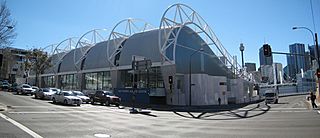
Ian Thorpe returned to competition in December 2005. He announced his intention to retire after the 2008 Summer Olympics. He decided to focus on the 100-meter freestyle and dropped his best event, the 400-meter. In February, he qualified for the 2006 Commonwealth Games in the 100-meter and 200-meter freestyle. He was disappointed with his times.
Soon after, Ian withdrew from the Commonwealth Games due to bronchitis. His illness was later diagnosed as glandular fever. After a broken hand, he moved to the United States to train. However, he changed coaches again, citing too much media attention.
Upon returning to Australia, Ian withdrew from the trials for the 2007 World Aquatics Championships. He announced his retirement on November 21, 2006. Ian said he had thought about retiring for a while. He thanked the Australian public and said his retirement was a "joyous" occasion.
Ian Thorpe's Comeback Attempt (2011–2012)
In February 2011, Ian Thorpe announced he would return to swimming. He aimed to qualify for the 2012 Summer Olympics in London. His main focus was the 100-meter and 200-meter freestyle races. He believed he could best help the Australian team in relays. He decided not to swim the 400-meter event.
Ian competed in several races in late 2011 to prepare. He swam in Singapore, Beijing, and Tokyo.
2012 Australian Olympic Trials
Ian Thorpe's comeback attempt for the 200-meter freestyle ended on March 16, 2012. This was during Australia's Olympic Trials in Adelaide. He swam well in the morning heats. However, in the semi-finals that evening, he tired in the last 100 meters. He finished 12th and did not qualify. He said the lack of recent racing experience might have affected him. In the 100-meter freestyle, he also failed to qualify for the semi-finals. This officially ended his bid to compete in the London Olympics.
After this, Ian aimed to qualify for the 2013 World Aquatics Championships and the 2014 Commonwealth Games. However, he had to stop these plans due to a shoulder injury.
Ian Thorpe's Athletic Strengths
Ian Thorpe's success came from his hard work, mental strength, powerful kick, and ability to speed up. His body was also naturally suited for swimming. Former Australian head coach Don Talbot called him "the greatest swimmer the world has seen." Ian was known for his special six-beat kick. This helped him pull away from rivals at the end of races. This powerful kick was partly due to his unusually large size 17 feet.
After his retirement, Bob Bowman, the coach of Michael Phelps, called Thorpe "the greatest middle-distance swimmer of all time." He also said Ian was "the greatest relay swimmer I have seen." Bowman noted that Ian helped make swimming more popular. John Coates, President of the Australian Olympic Committee, said that "Australians will still marvel at the feats of Ian Thorpe" for many years.
Honours and Awards
Besides his swimming achievements, Ian Thorpe has received many honors:
- 2000: Young Australian of the Year
- 2000: The Australian Sports Medal for his achievements.
- 2001: Awarded Medal of the Order of Australia (OAM) for his service to sport.
- 2001: The Centenary Medal for "service to Australian society through the sport of swimming."
- 2007: The Ian Thorpe Aquatic and Fitness Centre in Ultimo, Sydney, was named in his honor.
- 2012: Awarded the Human Rights Medal for his charity work with Indigenous children.
- 2013: Received an honorary Doctor of Letters from the University of Western Sydney. This was for his support for health and education for Indigenous youth.
- 2014: Received an honorary Doctor of Letters from Macquarie University. This recognized his contributions to sport, charity, and Indigenous rights.
- 2019: Became a Member of the Order of Australia (AM). This was for his "significant service to youth and Indigenous education through charitable initiatives, and to swimming."
- 2022: Inducted into the Swimming Australia Hall of Fame.
Ian Thorpe's Life After Swimming
Ian Thorpe presented a two-part TV documentary called Bullied on ABC Television. It showed what bullying feels like. It aired on March 14, 2017. In 2021, Thorpe competed in Celebrity MasterChef Australia (series 2). He was the fourth person eliminated. He has also written two cookbooks, "Cook For Your Life" (2011) and "Eat Well Now" (2016).
Personal Life and Interests
Advocacy for Fairness
Ian Thorpe has supported campaigns for equal rights and fairness for everyone. He encouraged people to register to vote.
Sponsorships and Public Image
Ian Thorpe is known for his interest in fashion. He has been an ambassador for Armani and has his own line of jewelry and underwear. During his career, he was one of Australia's most popular sports figures. He was often sought after for sponsorship deals. Besides Adidas, he was sponsored by companies like Qantas and Telstra.
Ian's interests in fashion and culture led him to visit New York City often. He was even present near the World Trade Center on the morning of September 11, 2001, before returning to his hotel. He also appeared on The Tonight Show with Jay Leno. Ian supported New York City's bid to host the 2012 Summer Olympics. In 2002, he played a role in the reality TV show Undercover Angels. He also appeared as an extra in the American sitcom Friends.
Ian Thorpe is very popular in Asia, especially Japan. In 2000, a Japanese TV broadcaster chose him as the main marketing face for the 2001 World Championships. He visited Japan to promote the event and was met by huge crowds. He was praised as a role model for young people. It was estimated that over 80% of the Japanese public watched his races. In 2002, he became an ambassador for the Australian Tourism Commission in Japan. This campaign helped increase Japanese tourism to Australia. In 2005, Yakult released a 'Thorpedo' energy drink in Japan, featuring his picture.
Charity Work and Giving Back
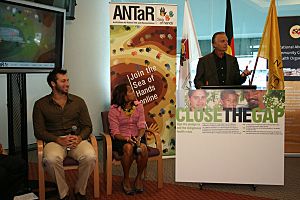
Ian Thorpe also became a philanthropist. He started the charity Ian Thorpe's Fountain for Youth in 2000. This organization raised money for research into childhood illnesses. It also supported a school in Beijing for orphaned children with disabilities. Additionally, it worked with The Fred Hollows Foundation to improve health and living conditions in Australian Aboriginal communities. The organization was closed in 2014.
See also
 In Spanish: Ian Thorpe para niños
In Spanish: Ian Thorpe para niños
- Ian Thorpe: The Swimmer, 2012 documentary
- Ian Thorpe Aquatic and Fitness Centre
- List of Australian Olympic medalists in swimming
- List of Commonwealth Games medallists in swimming (men)
- List of Olympic medalists in swimming (men)
- World record progression 200 metres freestyle
- World record progression 400 metres freestyle
- World record progression 800 metres freestyle
 | Victor J. Glover |
 | Yvonne Cagle |
 | Jeanette Epps |
 | Bernard A. Harris Jr. |


